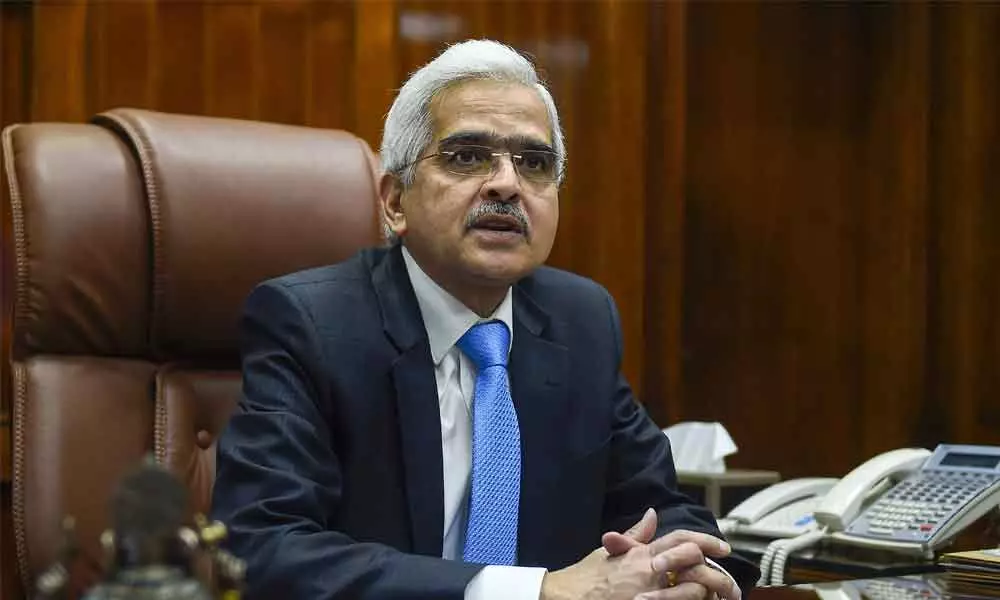Live
- PM Modi highlights govt's efforts to make Odisha prosperous and one of the fastest-growing states
- Hezbollah fires 200 rockets at northern, central Israel, injuring eight
- Allu Arjun's Family Appearance on Unstoppable with NBK Breaks Viewership Records
- Unity of hearts & minds essential for peace & progress, says J&K Lt Governor
- IPL 2025 Auction: I deserve Rs 18 cr price, says Chahal on being acquired by Punjab Kings
- EAM Jaishankar inaugurates new premises of Indian embassy in Rome
- Sailing vessel INSV Tarini embarks on second leg of expedition to New Zealand
- Over 15,000 people affected by rain-related disasters in Sri Lanka
- IPL 2025 Auction: RCB acquire Hazlewood for Rs 12.50 cr; Gujarat Titans bag Prasidh Krishna at Rs 9.5 crore
- Maharashtra result reflects the outcome of Congress' destructive politics: BJP's Shazia Ilmi
Just In
Green shoots of recovery need to sustain: RBI Governor Shaktikanta Das


Reserve Bank Governor Shaktikanta Das on Monday said the government will have to use structural reforms to revive demand and support the sagging economy and green shoots of the recovery visible now need to be sustained to pull India out of its worst slowdown in 11 years.
New Delhi: Reserve Bank Governor Shaktikanta Das on Monday said the government will have to use structural reforms to revive demand and support the sagging economy and green shoots of the recovery visible now need to be sustained to pull India out of its worst slowdown in 11 years.
In an interview with PTI, he said the fallout of the outbreak of coronavirus in China needs to be closely monitored by "every policymaker" to tailor a swift response.
While Finance Minister Nirmala Sitharaman's Budget for 2020-21 and recent steps have created a facilitating eco-system for reviving demand and consumption, it is necessary to undertake land and labour reforms, bring efficiencies in agri marketing and focus on skill development, he said.
Das said the RBI saw an imminent slowdown in growth early in 2019 and used the space that was opened up by the moderation in inflation to cut interest rates on five consecutive occasions.
He cited global trade and business uncertainties together with sluggish domestic demand leading to lower capacity utilisation at factories and twin balance sheet crisis of rising non-performing assets (NPAs) or bad loans on the one hand, and heavily indebted corporates on the other, for the slowdown in the economy.
"There are certain positive evidences visible. Things slightly picking up, but we have to wait and see whether these positive trends are sustaining themselves and we have to see how durable they are," he said.
He refused to say if the growth slowing down to 4.5 per cent in July-September was the bottom of the pit that the economy can see. "As I have said there are evidences of positive developments. But we have to see how durable these positive developments are before we pass a judgment that from here on it is an upward trajectory."
"By and large, if you look at our projection which we have given, things should start improving in the next financial year. For next financial year, we have projected 6 per cent of GDP growth against 5 per cent for the fiscal that ends in March."
The GDP growth in October-December is expected to drop below its previous quarter rate of 4.5 per cent despite a slight recovery in industrial production and positive manufacturing PMI.
Das, a career bureaucrat who was appointed RBI governor after the sudden exit of Urjit Patel, said he would refrain from characterising current slowdown as structural or cyclical.
"My response to such questions is that the response to the current situation has to be both countercyclical as well as structural that I have said earlier also. So, there is a need for counter-cyclical responses, which I think the Budget has attempted to respond through counter-cyclical measures.
"There are structural aspects also which needs to be undertaken. Some of these things have been mentioned in the budget. So, we look forward to more such structural changes," he said.
While Sitharaman thinks the slowdown is cyclical, others such as former finance minister P Chidambaram believe it is structural arising from the way the Modi government has handled the economy.
Structural reforms, Das said, should be in "agricultural marketing to make the supply chain and the value chain" more efficient. Also, the APMC Act, which gives states unbridled powers, needs to be significantly amended. "Then there is scope for land and labour reforms," he said.
"There has to be a focus on skill development and improving labour productivity, which will arise from labour reforms. Measures have been taken but these processes need to be continued."

© 2024 Hyderabad Media House Limited/The Hans India. All rights reserved. Powered by hocalwire.com






